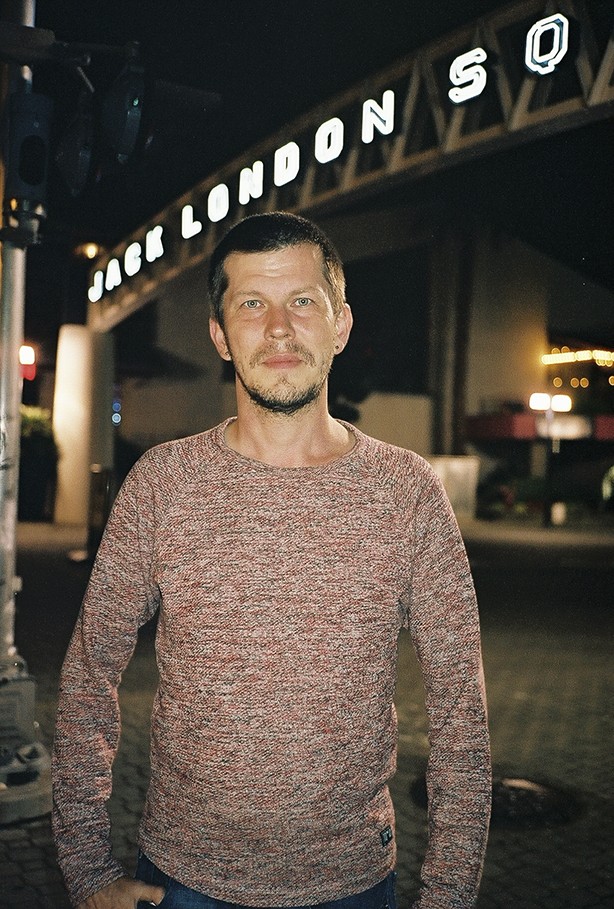
Sergey Piskunov can count at least 10 friends and acquaintances in Russia who were killed because they were gay.
It wasn’t always dangerous to be queer in Russia. In the early 2000s, there were gay pride parades in his hometown. People felt more comfortable coming out and living in the open. Piskunov, who is 36 years old, lived as an openly gay man for 15 years and had a successful career in Moscow.
In recent years, however, a homophobic campaign endorsed by Russian President Vladimir Putin has spread a message of bigotry. Hate crimes have proliferated, and the nation’s LGBTQ citizens have become increasingly fearful.
Reluctantly, Piskunov fled Moscow in 2015. He came to the Bay Area seeking asylum.
The violence LGBTQ people face in Russia has become “normal,” said Piskunov. “You have to be really cautious about things now.”
He describes his experience as an asylum seeker as unusually smooth. But it’s only because he already had friends in California ready to help. The National Center for Lesbian Rights connected Piskunov with legal assistance. Others helped him with housing. He was able to get an interview with an asylum officer quickly and gain approval for work.
For many others, however, the process is more arduous, taking years.
“It’s all in this first year that people are really dependent on others,” said Piskunov about asylum seekers. Barred from legally working, sometimes unable to fluently speak English, and unfamiliar with the culture and laws, asylum seekers often come to America with little or no money and suffering from trauma.
Piskunov is now part of Rusa LGBT, a network of Russian-speaking queer and trans asylees from Russia and other former Soviet nations where homophobia is increasingly leading to violent repression. They shelter newcomers, sometimes in any space available, like a foldout living room couch, and they provide connections to legal resources and other tools to gain permanent status in the United States.
Piskunov says it’s difficult work. There are no nonprofits focused on helping asylees, nor government programs.
And now LGBTQ asylees from Russia are facing a new obstacle. As a result of sanctions President Donald Trump was pushed to sign to punish Russia for meddling in US elections, Russia expelled hundreds of American diplomats. As of Aug. 23, the US Embassy is suspending issuance of non-immigrant visas — virtually the only travel visa allowing LGBTQ asylees to escape Russia.
The Trump administration’s actions have also harmed LGBTQ refugees. Different from asylum seekers, refugees are people who flee their country first and then seek permanent refuge in another nation. But they’re typically stuck in camps in third-party countries before the United Nations can find them a new, safer home.
[pullquote-1]
According to the United Nations High Commission on Refugees, 77 nations have criminalized same-sex relationships. For this and other reasons, the number of LGBTQ refugees has grown in recent years. People are running from violence in places like Uganda, Iraq, and El Salvador, where being queer or trans can be a death sentence, and where there are no laws against homophobic violence.
Wade Meyer and Amy Weiss run the only official LGBTQ refugee resettlement program in the United States through Jewish Family & Community Services East Bay.
Since they established the program in 2012, they’ve served between 10 and 15 LGBTQ refugees each year, out of a total 170 refugees coming to the Bay Area through their agency.
Meyer started working to coordinate the program full-time last year, with a goal of rapidly growing the number of LGBTQ refugees. He helps newcomers apply for government benefits, enroll in English language classes, get medical benefits, and seek job training.
Housing is a key need, of course. “Luckily we have this group of hosts,” said Meyer, “people who have an extra room in their house and are willing to share it with a refugee.” This host network is especially crucial in the most expensive housing market in the nation.
Weiss said that LGBTQ refugees are unique because they’re often fleeing the kinship networks that other immigrants can rely on to resettle and find shelter and work. “All LGBT refugees have experienced high levels of trauma, and they’re fleeing from family and coming without a community to welcome them,” she said.
But Trump’s suspension of refugee arrivals has cut off this pathway for LGBTQ people seeking safety in America. When a lower court suspended Trump’s temporary refugee ban, several LGBTQ refugees were able to come to the Bay Area. But the U.S. Supreme Court’s ruling in June that refugees must have “bona fide” family relationships in America to gain approval has effectively cut off the flow of LGBTQ people escaping violence and persecution as refugees.
“It’s a very narrow set of biological relationships, or through marriage,” said Meyer about the new, stricter criteria. “LGBT people are often escaping their families, so they’re very unlikely to have a family member in the U.S. to sponsor them. It essentially stops LGBT refugees from arriving.”
The refugee ban isn’t permanent, and could expire entirely, allowing LGBTQ refugees back into the United States. Or, the Trump administration could open up arrivals from specific nations or take other steps that would allow queer and trans people a route to freedom. Or, the ban could be made permanent.
In the meantime, new limits on travel for refugees and Russians have created a nightmare scenario for LGBTQ people seeking a new home in America. Piskunov said that shortly after he arrived in the United States, he would have nightmares that he was back in Russia and he couldn’t board the plane to leave for the Bay Area.
“Now, it looks like this nightmare is coming true,” he said.












